The Art of Adi Da Samraj
 November 24 - December 1, 2013
presented by:
November 24 - December 1, 2013
presented by: 

Sections on this page:
 The Art of Adi Da Samraj
The Art of Adi Da Samraj

Three periods of Adi Da's art are represented
in this exhibition:
- the Bright Field photography collection (2000-2001)
- the Quandra Loka Suite (2002-2003)
- Adi Da's Suites, Orpheus One and Linead One
(2010)
Bright
Field Photography. Adi Da's black-and-white photographic
art from 2000-2001. Most of Adi Da's images during this period
are highly sophisticated and complex multiple exposures, often
involving more than two (and even as many as ten or more)
superimposed layers, shot in camera. Adi Da presents his images
in suites, rather than as single images. Each suite can have
anywhere from a few images to several hundred. Each suite
is very different in quality: a "meditation" on a rock that
rises out the of the ocean, a series of sensual and playful
images set in a city, a look at human personalities as "shattered"
phenomena, and so on. Every suite takes the viewer on an artistic,
emotional, intellectual, and spiritual journey.
|
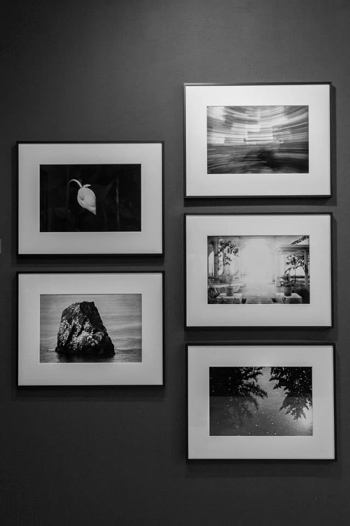
Adi Da's Bright Field photography at the PAN
Amsterdam Art Fair
photo courtesy of Hans
Mahler
Click on image to view enlargement.
|
Related links:
- For more about Adi Da's Bright Field photography, read
and view the catalog, The
Bright Field.
The Quandra Loka Suite. Adi Da describes
the Quandra Loka Suite as being of "indefinite
length". It is a vast Suite comprised of over 21,000
images. Here are a few.
Click on images to view enlargements.
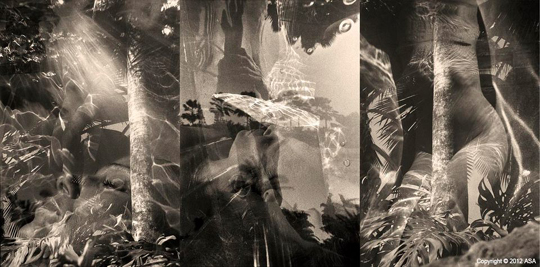
Quandra Loka #304
Triptych, face mounted pigment prints, 59 x 118 in / 150 x
300cm
Quandra Loka — a suite of interrelated photographs
with a single overarching subject matter — was created
by Adi Da in 2002-2003. Quandra Loka represents the
pinnacle of Adi Da's photographic method. Almost all of the
images in this suite are complex multiple exposures, typically
involving more than two (and even as many as ten or more)
superimposed layers. He created each of these multi-exposed
images entirely in camera, mostly underwater, without the
use of artificial lighting and the aid of any digital or darkroom
manipulation. As a result, His works are of a contemplative
and enigmatic character.
Adi Da writes about His Quandra Loka Suite:
|
Quandra Loka is a visual meditation on a very
simple circumstance: a woman in and near a pool of water.
Narcissus, the archetype of ego, gazes at his own reflection
in a pond, never able to contact the "object" of his
self-enamored affection. But Quandra, the true beloved,
is one with the water itself, whether in or out of the
pool.
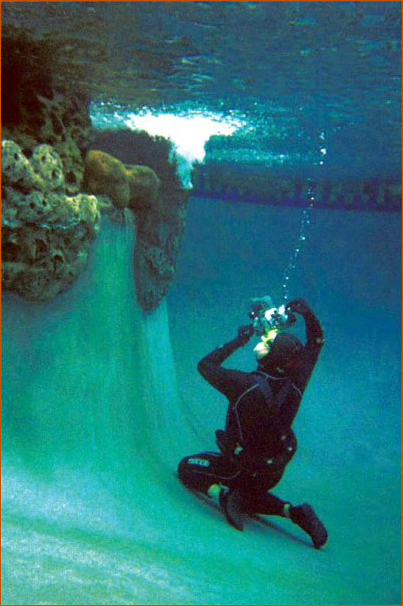 I shot the majority of the images in Quandra Loka
underwater, or with the camera lens partially submerged
in water, so that the water functions as a vast and
subtly complex lens, achieving visual results not possible
by any technical means. The images are made by a "technique"
that requires continuous participation in the living
instant of the photographic situation — sensitive to
the constantly changing sunlight conditions, the ever-shifting
minute movements of the subject, and even my own ability
to stay submerged underwater. This "method" is beyond
conceptual effort, beyond conventions of control in
the ordinary sense, beyond point of view. This process
of generating images — involving absolute awareness
of every detail of what is occurring and (simultaneously)
an intuitive trust in allowing the ultimately unpredictable
process to take place — is a means of allowing reality
to be self-manifested.
I shot the majority of the images in Quandra Loka
underwater, or with the camera lens partially submerged
in water, so that the water functions as a vast and
subtly complex lens, achieving visual results not possible
by any technical means. The images are made by a "technique"
that requires continuous participation in the living
instant of the photographic situation — sensitive to
the constantly changing sunlight conditions, the ever-shifting
minute movements of the subject, and even my own ability
to stay submerged underwater. This "method" is beyond
conceptual effort, beyond conventions of control in
the ordinary sense, beyond point of view. This process
of generating images — involving absolute awareness
of every detail of what is occurring and (simultaneously)
an intuitive trust in allowing the ultimately unpredictable
process to take place — is a means of allowing reality
to be self-manifested.
I intend these images to "picture" the unity of the
undifferentiated reality from which all appearances
emerge in a constant flow of changes. The entire span
of human possibilities is reflected in these images
— both "positive" and "negative." But all possibilities
are seen in the context of that inherent unity or indivisible
space. The positives and the negatives are all transcended,
rather than any attempt being made to render them acceptable
in and of themselves.
Avatar Adi Da Samraj
|
|
full page link If video won't play in place, refresh the page and try again. Or you can click "full page link" (above). | length: 06:32
In late 2002 and early 2003, Adi Da Samraj created the photographic suite, Quandra Loka. The images are generally multiple exposures on a single black-and-white frame of film. Adi Da then created configurations (diptychs, triptychs, and polyptychs) from the single frame images.
Music is "Facing Beloved", from the CD, Facing Beloved, with John Wubbenhorst (bansuri), Subash Chandran (ghatam) and Ganesh Kumar (kanjira). This piece is based on a melody from J.S. Bach (siciliano) with elements of Raga Kirwani. |
Related links:
Orpheus
and Linead. Adi Da’s digital drawings are informed by
a complex vocabulary of forms, colors, and spiritual concepts.
In His suites, Orpheus One and Linead One, He
uses two major visual elements in each work, which He calls
lineads and geomes. Lineads are hand-drawn gestural marks and
curvilinear lines; geomes are solid geometric shapes. There
is a momentum that takes place as the lineads uncoil upon the
harmoniously positioned blocks of colors or the geomes. Together
these forms unite to create a sense of dynamism and movement
within the drawings.

|
The secret of Orpheus is hidden (or encoded) in the
images — the secret of the flight out of the hell and
into the Earth-world, and, ultimately, into the Divine
Domain of Conscious Light.
Avatar Adi Da Samraj
|
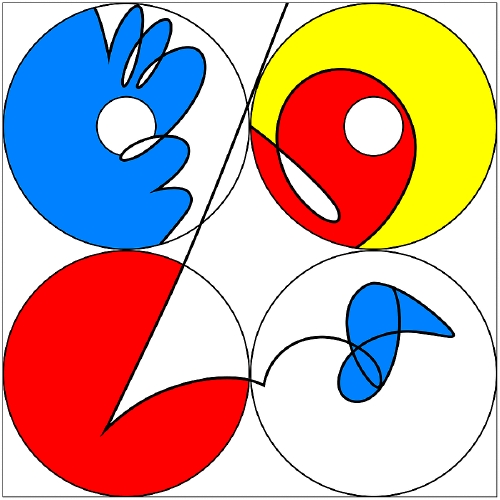
Eurydice One: The Illusory Fall of The Bicycle Into
The Sub-Atomic Parallel Worlds of Primary Color and
Point of View - Part Three: The Abstract Narrative
In Geome and Linead (Second Stage) - 1, 2
2007, 2010 Lacquer on aluminum 96 x 96"
© 2011 ASA
[Click on image for enlargement]
|
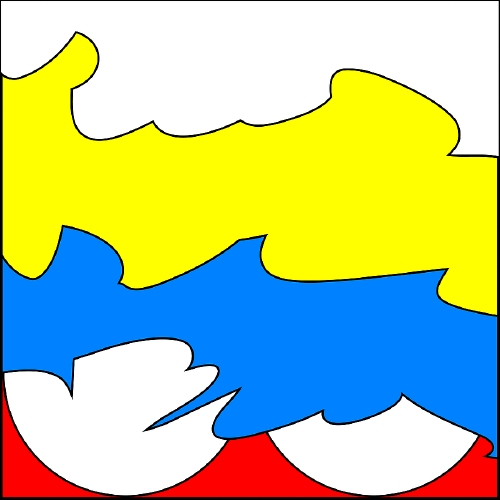
Eurydice One: The Illusory Fall of The Bicycle
Into The Sub-Atomic Parallel Worlds of Primary Color
and Point of View - Part Three: The Abstract Narrative
in Geome and Linead (Second Stage) - V, 2
2007, 2010 Lacquer on aluminum 72 x 72"
© 2011 ASA
[Click on image for enlargement]
|
|
full page link If video won't play in place, refresh the page and try again. Or you can click "full page link" (above). | length: 06:47
views: 5331
Adi Da Samraj creating the Orpheus One and Linead One suites. Accompanied by Adi Da talking about His Image-Art. Edited by Carmen Morrow. |
Related links:
- Images from Orpheus and Linead were first exhibited
at the Sundaram Tagore
Gallery in New York, in September, 2009.
- Opening
Night remarks by Achille Bonita Oliva, at the September
2009 exhibition of Adi Da's Orpheus and Linead (video).
- A further showing of images from Orpheus and Linead
was exhibited at the Sundaram
Tagore Gallery in Los Angeles, in September, 2011.
- Orpheus
in the Modern World, art panel held on October 5, 2011,
based on Adi Da's art in Orpheus and Linead (audio).
- For more about Orpheus and Linead, read and view
the exhibition catalog, Orpheus
and Eurydice.
 Galerie Pien Rademakers
Galerie Pien Rademakers

|
Galerie
Pien Rademakers is presenting pieces from three
different periods of Adi Da's artwork at the 2013 PAN
Amsterdam Art Fair.
|
|
|
| |
|
Pien Rademakers
|
|
Galerie Pien Rademakers exhibition
Booth 22
PAN Amsterdam Art Fair 2013
dates: November 24 - December 1, 2013
address: RAI Parkhal (Hall 8), Amsterdam
web address: here
(tickets can be purchased on this site)
|
|
full page link If video won't play in place, refresh the page and try again. Or you can click "full page link" (above). | length: 05:45
event date: November 18, 2012
views: 5154
Interview with gallerist Pien Rademakers, who displayed works from Adi Da's Quandra Loka Suite in her Galerie Pien Rademakers in Amsterdam, The Netherlands, and also exhibited them at the 2012 Pan Amsterdam Art Fair.
Pien talks about the significance of Adi Da's Image-Art, and the importance of spreading the word and having increasingly more people experience it.
For more about these exhibits, click here.
Music: Arabesque No. 2 by Claude Debussy; and
Prelude in G Minor by Frederic Chopin
Performed by: Naamleela Free Jones, on her album, Hers To Me
Camera: Tanja Fleischmann (Fleischmann Film)
Production: Jasper van Laar (Way Media) |
 The 2013 PAN Amsterdam Art Fair
The 2013 PAN Amsterdam Art Fair

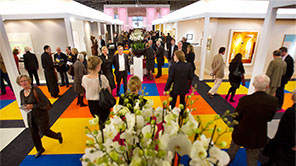 PAN
Amsterdam is a mecca for art-lovers with an individual
style. A modern-day art fair that provides surprise, variety
and quality. A journey through time, it covers every possible
manifestation of art and design — from a statue from Classical
Antiquity to designer objects by Studio Job, from contemporary
art and photography to Old Masters — this is what makes PAN
Amsterdam so special. On one day and under one roof you can
see the past and the present of numerous art disciplines happily
coexisting. Visit PAN Amsterdam to admire art, to discuss
it and learn about it or, better still, to buy your own work
of art. PAN
Amsterdam is a mecca for art-lovers with an individual
style. A modern-day art fair that provides surprise, variety
and quality. A journey through time, it covers every possible
manifestation of art and design — from a statue from Classical
Antiquity to designer objects by Studio Job, from contemporary
art and photography to Old Masters — this is what makes PAN
Amsterdam so special. On one day and under one roof you can
see the past and the present of numerous art disciplines happily
coexisting. Visit PAN Amsterdam to admire art, to discuss
it and learn about it or, better still, to buy your own work
of art.
Each work of art is extensively vetted for quality, authenticity
and condition by more than eighty experts before the fair
opens. Enjoying art, top quality and buying with confidence
— that’s what PAN Amsterdam is all about. This is why more
than 50,000 art lovers and professional and private collectors
come to PAN Amsterdam every November.
 Exhibition at the PAN Amsterdam
Art Fair
Exhibition at the PAN Amsterdam
Art Fair 
Click on images to view enlargements.
|


186,104 people have liked our site's pages and shared them with their Facebook friends - Most Shared Pages
© 2025 Copyrighted materials used with the permission of The Avataric Samrajya of Adidam Pty Ltd, as trustee for The Avataric Samrajya of Adidam. All rights reserved. None of these materials may be disseminated or otherwise used for any non-personal purpose without the prior agreement of the copyright owner. ADIDAM is a trademark of The Avataric Samrajya of Adidam Pty Ltd, as Trustee for the Avataric Samrajya of Adidam.
Technical problems with our site? Let our webmaster know.